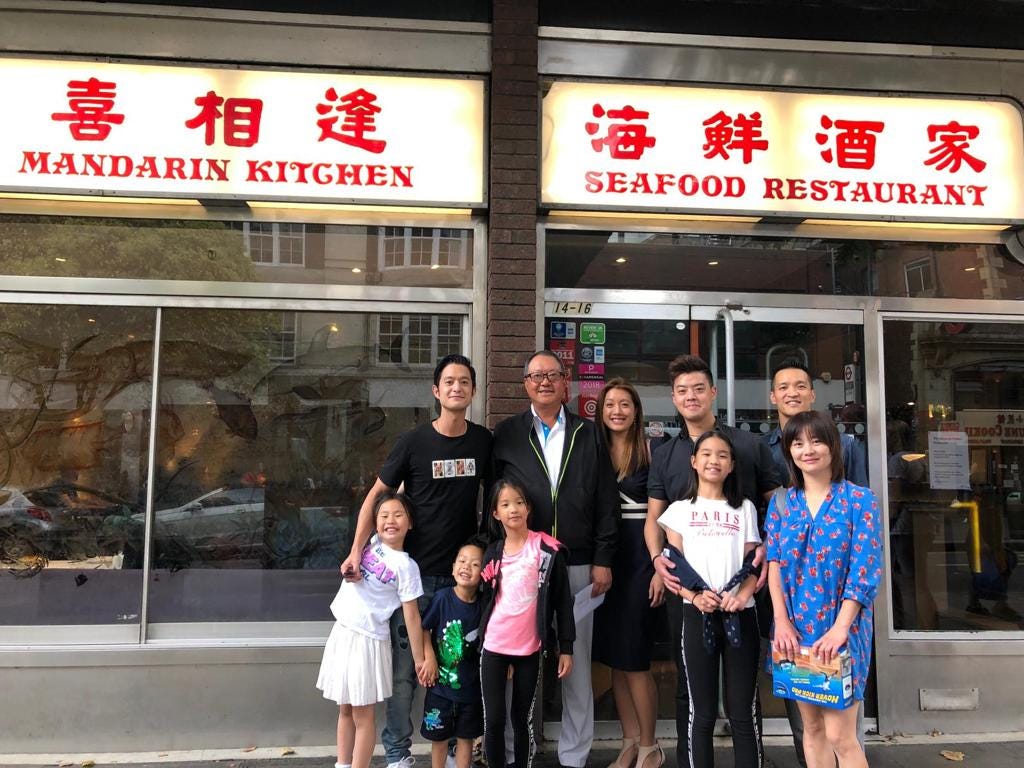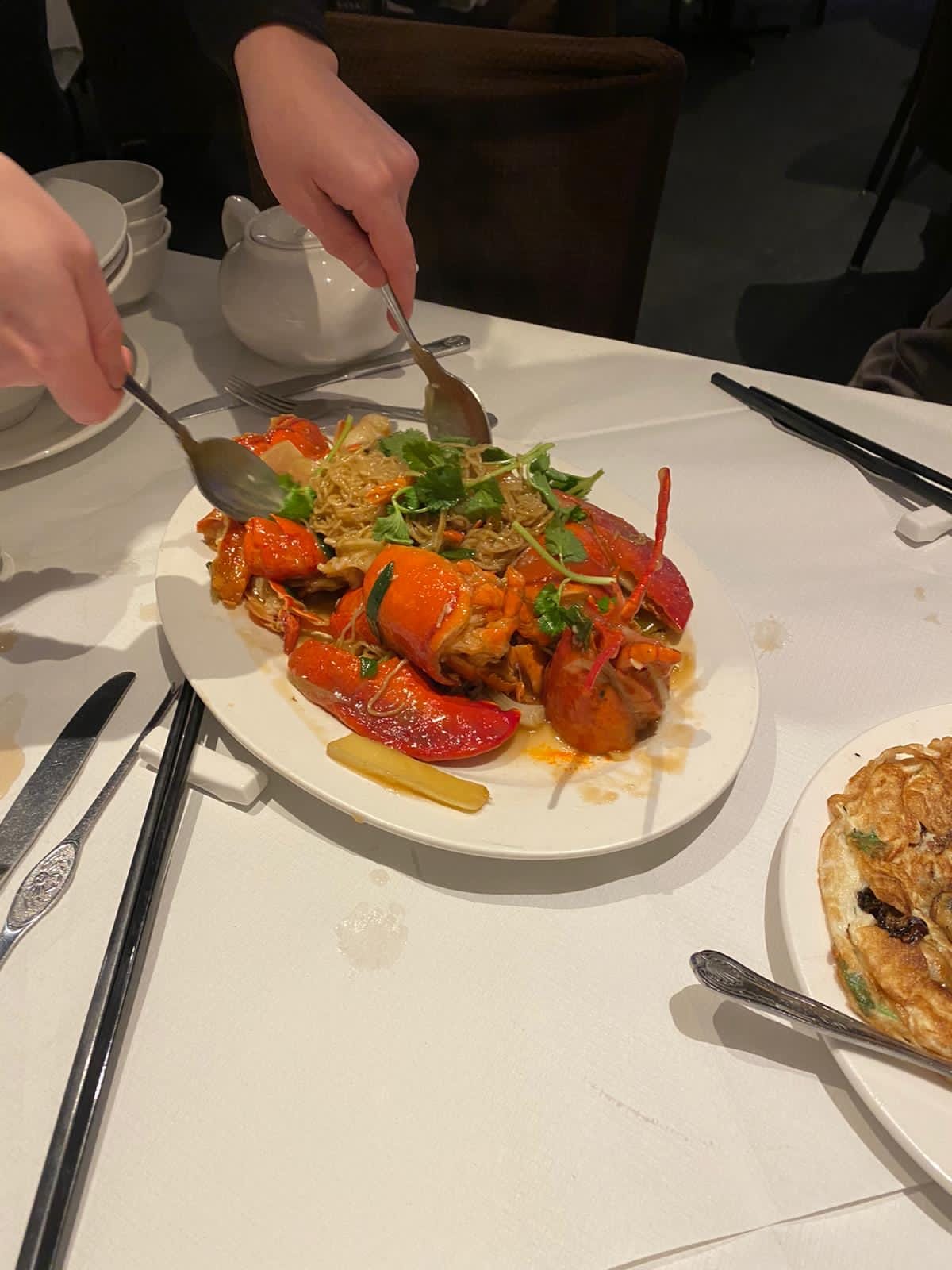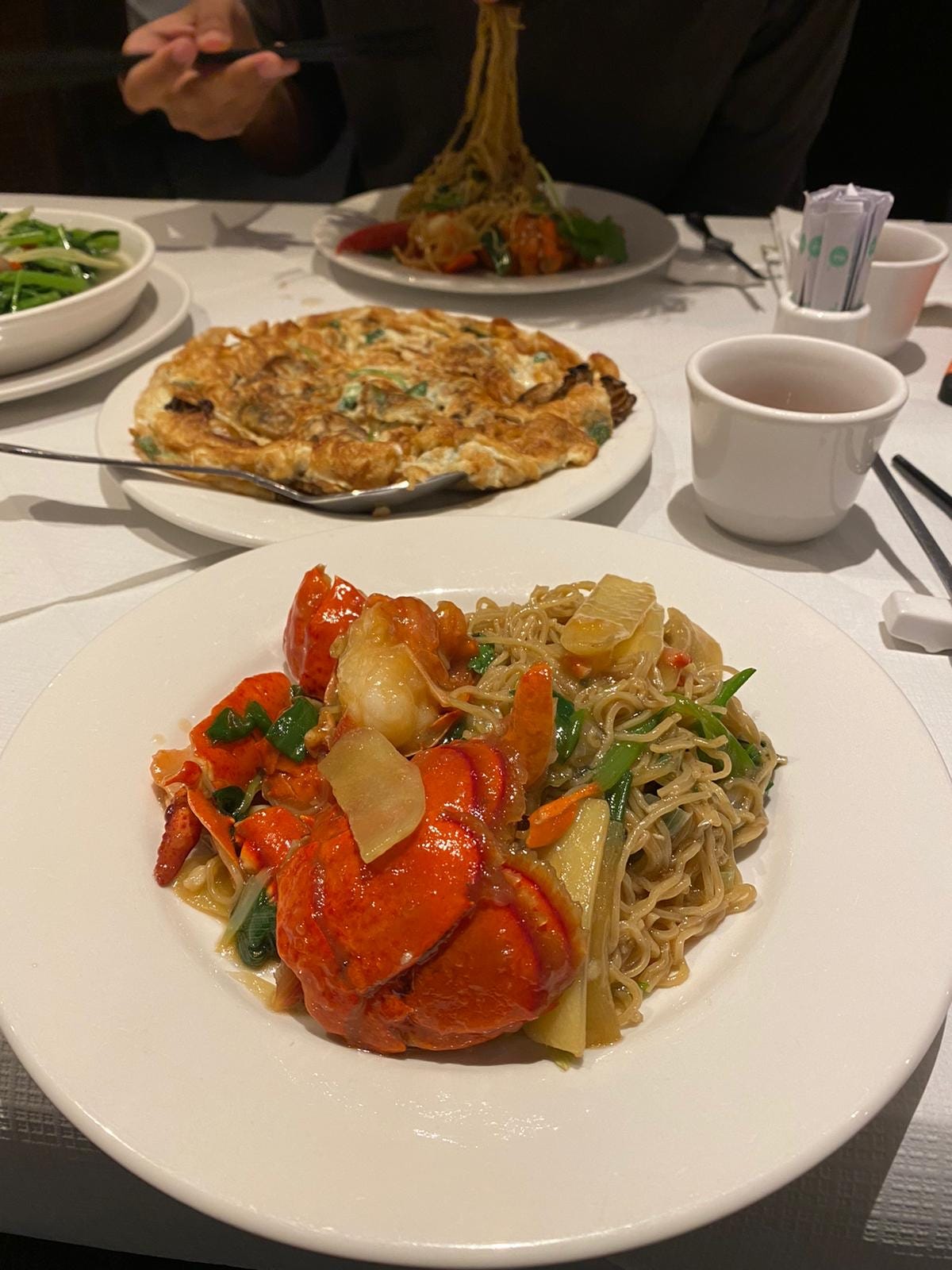The Story of Mandarin Kitchen
Words by Ysabelle Cheung
The Story of Mandarin Kitchen, by Ysabelle Cheung
In memory of Stephen Cheung
It was an unseasonably dry Monday in March when I went out to the post office in Quarry Bay to ship face masks to New York. Hong Kong had been in the grip of COVID-19 for weeks already, and the situation seemed, relative to other places, under control. But over in the United States and the UK, the epidemic was just beginning. Like many people in Hong Kong concerned for what was to come, my friends and I set up a mutual aid circuit to deliver PPE abroad. But our gestures seemed futile, like flimsy umbrellas in a typhoon. The numbers were still rising.
Later that evening, my brother messaged me with the news that Stephen Cheung, the owner and co-founder of Mandarin Kitchen in London, had contracted the virus and passed away. I was devastated. My family had known Stephen for decades; he was a fixture in the Chinese diaspora restaurant scene, providing not only countless meals but a space of belonging, of memory and home.
Thinking of him, I was immediately swept back to Bayswater and the house where I spent the first eight years of my life. I could still see the ice-skating rink, fringed with salons and kebab joints; the copper vats of coffee beans at the Greek tavern around the corner; the iron centaurs, slick with fountain water, at our local shopping centre. In those days my family spoke more Cantonese than English, and in that internet-less, mobile-less era, we passed most of our time in the Chinese restaurants that lined Queensway – one of which was Mandarin Kitchen.
Like all places, Mandarin Kitchen used to be something else. Before it opened in 1978, the space held a 1960s Italian disco club, then an Italian bistro, and then a generic Chinese restaurant. It was in this last incarnation that two Hong Kong immigrants met: Helen Li, a waitress at the establishment, and Stephen Cheung, a seafood trader who would visit her after work. Together, they envisioned a new food concept for London: a classy Cantonese restaurant outside of Soho’s Chinatown specialising in seafood, a tribute to the cuisine of their home city.
The idea was new and risky. In the 1960s and early 1970s, most of the Chinese restaurants in London were either takeaways that cobbled together sweet and sour pork alongside pies and chips, or high-end, Anglicized spaces, such as Knightsbridge’s Mr Chow, which opened in 1968. A sharp uptick in immigration from Hong Kong to London – mainly driven by political turmoil – then led to restaurants in the “Hong Kong style,” featuring popular Cantonese dishes. Lido’s in Chinatown had opened serving dim sum in 1969 , and Poon’s dished out siu yuk, but curiously there was a dearth of seafood, despite its significance and history in Southern Chinese cuisine.
There are several possible theories for this scarcity. One is that because of England’s long history of immigration, the districts that Hong Kongers settled into were already fully established, especially in Soho’s emerging Chinatown. “I suspect there were already restaurants in the area – you had the French, Russian Jews, Italian communities, Greek communities, and there was a meat market nearby,” says Freya Aitken-Turff, CEO of China Exchange and the co-author of Chinatown Stories, a forthcoming historical book on the area’s history. These existing restaurants and communities might have influenced the style of food served in the new Cantonese restaurants, as incoming immigrants saw that meat was already easily attainable – and also readily accepted. “Seafood probably wasn’t to everyone’s taste back then, especially for your average white man,” Alex Cheung, Stephen and Helen’s son and the second generation owner of Mandarin Kitchen, tells me. “Some were almost squeamish about seeing it.”
Given this backdrop, Helen and Stephen’s choice of specialty seems particularly bold. They sketched out a starter menu of Cantonese fare, including the now-famous lobster noodle with ginger and scallion, an instant crowd-puller. Deceptively simple, the dish bucked tradition: in typical Guangdong banquets, lobster and noodles are always served separately, with the former representing wealth and the latter signifying longevity. But together, these ingredients shone: the lobster smashed into pieces, its tail, eyes, and antenna floating in a glistening river of brine and egg noodles. The dish’s popularity has led to it becoming synonymous with Mandarin Kitchen (Google “lobster noodle” from a London computer and the restaurant will come up) but back when it was first served, the plating of lobster and noodles together was unusual in both Hong Kong and London. A local chef I spoke to in Hong Kong, Mak Shiu Keung, first saw the dish at the restaurant chain 漢寶 whose main branch opened in 1986, where it is typically served blanketed in cheese. But whether it arrived in Hong Kong because of its popularity at Mandarin Kitchen or was invented simultaneously due to increasing culinary cross-pollination between the two cities, is impossible to verify.
Stephen and Helen’s proclivity for the unorthodox began with seafood and continued through to the restaurant’s décor. Most people remember the oddly European whitewashed ceilings or burnt orange banquettes, but the most novel design choice was its riff on the aquarium, typically found at the entrance of a Chinese restaurant for feng shui purposes. For Mandarin Kitchen, Stephen transformed the storefront into a single king-size fish tank, so that passers-by coming out of the tube station might see giant blue lobsters or the glint of fish scales as if in an immersive menagerie. Eventually this feature became unsustainable. “The sunlight would penetrate the tank, and when we picked out a lobster or fish it would splash water all over customers,” says Alex, who was a toddler at the time and remembers the pageantry of selecting one’s dinner just before eating it, a common practice in Hong Kong seafood restaurants. The tank was removed but they kept the steel frame, and Stephen commissioned a seabed mural from a glaze painter and friend.
Like all the Chinese restaurants that later gravitated to this strip of Queensway – Four Seasons, New Fortune Cookie, Royal China and Goldmine among them – Mandarin Kitchen grew to symbolize a nostalgic belonging, of connecting with history and Chinese culture. It was the ultimate antithesis to vacuum-dry silver-service dining; an extension of our own houses and flats with better food and wait staff that volleyed jokes at you in Cantonese. In my research for this story, I found others like myself who have patronized the restaurant for decades, such as food blogger Euwen Teh, whose family emigrated from Germany in the late 1980s. “Meeting up here for a meal is synonymous with our 7pm on the dot every night home dinners, and it just means family time to me,” he says. They still eat there every Lunar New Year.
For those of Stephen and Helen’s generation, it was more than just familiar food that connected them to Mandarin Kitchen. My mother tells me she knew the co-founders more in a social context than as restaurant owners. This sentiment was echoed by relatives and close family friends. For second-generation immigrants like myself, however, Mandarin Kitchen helped access a part of my identity that was otherwise suppressed, in a city that was slow to embrace diversity and the global diaspora. When I think of being Chinese, I of course think of Hong Kong. But I also think of Mandarin Kitchen’s amber glass doors, keeping out the baying wind; Stephen, Helen or Alex waving a hello; waiters conversing in Concorde-speed Cantonese; the dancing lion that arrived every Chinese New Year to eat up your red packets; children playing tag under paper lanterns; and plates of glossy lobster, crispy duck, and razor clams, circling round and round and round on the lazy Susans.
Asian-American writer Jennifer 8. Lee once said that food is “the primary ambassador of first contact between cultures, one that transcends spoken language.” Mandarin Kitchen is a portal: one that introduces not only Cantonese culture, but specifically Cantonese culture of a past era. Over the course of four decades, Stephen never changed his menu to include trendier regional dishes brought in by new waves of mainland Chinese immigrants. He showed no desire to expand into an empire. He did not adjust the lively, and very Cantonese, style of service, which some customers have deemed “shocking” or “unfriendly”. In an age where anything vintage can be up-marketed for profit, he never promoted Mandarin Kitchen as anything other than a simple restaurant serving Cantonese food.
There is something uniquely refreshing – and stubborn, a quality that Stephen certainly possessed – about this unwillingness to change according to the metrics of the changing socio-political landscape of the Chinese diaspora or the dining fads in London. Perhaps Mandarin Kitchen’s unwavering commitment to staying the same was the biggest gamble of all, but it also reveals Stephen’s fundamental understanding of the way that the tides keep changing, no matter how hard you try to assimilate or to please everyone. That gamble has paid off; no other place like it exists in either Hong Kong or London. Over the years it has welcomed Japanese and Korean businessmen looking to close deals with clients; members of the British Royal family; Muslims indulging in Halal dishes; Michelin star chefs enjoying a quiet meal; London food bloggers; and tourists from Asia passing through, curious about the hybridized lobster noodle. Writer Kevin Kwan infused a certain diaspora locality to his “Crazy Rich Asians” trilogy in mentioning the restaurant throughout, noting that “Asian foodies will fly to London just to savour Mandarin Kitchen’s signature dish, because nowhere else in the world can one get Chinese hand-pulled egg noodles braised in an intoxicating ginger scallion sauce, served with giant lobsters caught daily from the Scottish Sea.”
But it has not been an easy 42 years for the Cheung family. The restaurant business, especially for immigrants, is often an endurance game. There is often little time for anything else other than perseverance and hard work – and the work is always hard. This perseverance can often be misinterpreted as rushing by those unfamiliar with such environments, hence the comments about service being “unfriendly”. But to me, a true Cantonese establishment will always be the sound of a waiter urgently flipping his notepad and the kitchen door pushing open, revealing for a second the fire-oiled wok generating its breath, something ambrosial flocking high in the air. The rush reminds us that the owners are people, and they also have mouths – families – to feed.
In March, Mandarin Kitchen closed for the first time in decades, due to social distancing restrictions and Stephen’s passing. In the restaurant’s 42-year, seven-day lunch and dinner rush, there had never been any time to focus on anything apart from the running of the restaurant. So Alex and his brother Robert took the opportunity to finally build a website, with new photographs and a short text on the history of Mandarin Kitchen. An announcement on the front page noted a reopening date of July 17 and an invitation was extended to everyone: “It is our honour to share occasions big and small with our customers!”
In Hong Kong, a restaurant can appear and disappear in mere months. By comparison, London gentrifies at a snail’s pace, but change is nevertheless inevitable. On my last trip to Mandarin Kitchen in 2019, I noticed that the nearby perm salons had been replaced by a Pret a Manger. Whiteleys, its centaurs long gone, was under renovation, and the currency exchange stalls on the corner had been demolished to make way for a sleek new apartment complex. I was happy to see that Mandarin Kitchen was still in its spot, mostly the same, still baring all its history. Today, if you peer upwards, you’ll still see Mediterranean-white barrel-vaulted booths and holes that once held disco speakers—vestiges of other times and other memories.
This year has forced many to adapt and change. Many restaurants have shuttered; close-contact dining and bars packed full seem like long-distant memories. For Mandarin Kitchen, the hardest adjustment will be the loss of its co-founder. Yet Alex and Robert are determined to preserve the legacy of the restaurant and its significance to the people it has served for decades. Although the mural at the front is now gone – nothing escapes the weathering of time – the sea theme remains. Subtle markings on the glass and the glug-glug of water features recall the old fish tank, the contoured bar mimicking the hull of a ship. It’s a fitting image, and one of our current era: A vessel pushing tirelessly, indefatigable, against an unseen current.
Ysabelle Cheung is a writer and editor based in Hong Kong. Her nonfiction and criticism has appeared in The Atlantic, Artforum, Literary Hub, and the Los Angeles Review of Books. Find her on Twitter @ysabellecheung.
Thank you to Alex Cheung and Feroz Gajia for additional photos.






Sincere condolences to the Cheung's family members. I was fortunate to be working there (1986-1992, Islington and Queensway). Helen and Stephen were always supportive during my stay in London. Once again, thank you very much for everything.
I’m a Chinese Malaysian. When we stayed at London for a wk a few yrs ago, we made bookings to eat at Mandarin Kitchen 5 times and it was the best meals ever ! Many condolences to the Cheung family x